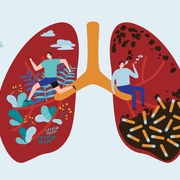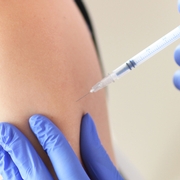Subscribe to our WHA Blog here.
To view older blogs visit our WordPress blog.

April is National Autism Awareness Month
Join Western Health Advantage in observing April as National Autism Awareness Month, which promotes autism awareness, autism acceptance and draws attention to the tens of thousands facing an autism diagnosis each year.

Are You at Risk for Type 2 Diabetes?
March 26, 2019 is American Diabetes Association Alert Day. Western Health Advantage and the American Diabetes Association promote this day to bring awareness about the risks for developing type 2 diabetes – and what can be done to prevent it. In the U.S., 86 million people have pre-diabetes, putting them at high risk for developing type 2 diabetes. Most people at risk do not realize it.

Kick Butts Day is March 20, 2019!
Kick Butts Day, organized by the Campaign for Tobacco-Free Kids, occurs on March 20, 2019. This is a great day to get involved in helping smokers you know give up smoking.

National Poison Prevention Week is March 17-23, 2019
Poisoning is the #1 cause of injury-related death in the U.S. The third week in March each year is designated by Congress as National Poison Prevention Week, a week dedicated to raising awareness about the burden of poisoning in the U.S. and highlighting specific ways to prevent it.

Enjoy a worry-free spring break with these 4 tips from WHA Partner Assist America!
Plan Activities for Everyone
Make sure each member of your family has something to look forward to on the trip. For example, prior to departure, contact your resort or travel agent to pre-book excursions and activities that each and everyone will enjoy during spring break.

Preteen Vaccine Week Promotes Immunizations
To help protect adolescents against dangerous diseases, Western Health Advantage (WHA) is joining with the California Department of Public Health in recognizing March 3-9, 2019 as Preteen Vaccine Week.

Colorectal Cancer Screening is Very Important
To increase awareness about the importance of colorectal cancer screening, Western Health Advantage is proudly participating in Colorectal Cancer Awareness Month this March. In California, colorectal cancer is the third most common cancer diagnosed (excluding skin cancers), with over 14,000 Californians diagnosed annually.

Improve Your Heart Health this February
WHA is proud to participate in American Heart Month this month, in partnership with the American Heart Association. This is a great time to commit to a healthy lifestyle and make small changes that can lead to a lifetime of heart health. Heart disease is the leading cause of death for both men and women in the United States. Every year, 1 in 4 deaths are caused by heart disease. The good news? Heart disease can often be prevented when people make healthy choices and manage their health conditions. You can make healthy changes to lower your risk of developing heart disease. Controlling and preventing risk factors is also important for people who already have heart disease. To lower your risk:

Join WHA at the 2019 Sacramento Undy Run/Walk!
On Saturday, February 16, 2019 Western Health Advantage (WHA) will be raising awareness about colon cancer by participating as a sponsor and as a team – WHAtch Your Tushie – in the 2019 Sacramento Undy Run/Walk put on by the Colorectal Cancer Alliance.

Go Red for Women on February 1st
Join millions of women and Western Health Advantage in the fight against heart disease on Friday, February 1, 2019 for the American Heart Association’s National Wear Red Day. Whether on the job or walking outside, illuminate your wardrobe and support women fighting heart disease. Heart disease is the No.1 cause of death in women and it’s time to take a stand……in RED! Go Red for Women is a nationwide event that is devoted in helping women fight back against heart disease. Alarming heart health statistics include:

3-2-1: How You Can Help Teens Build Healthy Habits
Holiday treats and New Year’s resolutions can serve as opportunities for adolescents to reflect on their eating, exercise, and nutrition habits. Healthy habits in the teen years can support teens’ development now and their health in the future. The U.S. Department of Health & Human Services/Office of Adolescent Health has some suggestions below for adults to keep in mind as they support teens.

Folic Acid is Important for Pregnant Women
January 8-14, 2019 is Folic Acid Awareness Week. The National Birth Defects Prevention Network promotes this week to increase awareness of the importance of consuming enough folic acid, particularly for pregnant women. Folic acid is a B-vitamin that is necessary for proper cell growth. If taken before and during early pregnancy from a multi-vitamin or fortified foods, folic acid can prevent from 50% up to 70% of some forms of serious birth defects of the brain and spine. Experts recommend that women who may become pregnant should take 400 micrograms of synthetic folic acid daily, by:

January is National Cervical Cancer Awareness Month
Many young women are missing the opportunity to be screened for cervical cancer. As January is National Cervical Cancer Awareness Month, WHA would like to remind you of the importance of cervical cancer prevention and early detection. Cervical cancer, which forms in the tissues of the cervix (the organ connecting the uterus and vagina), is almost always caused by human papilloma virus (HPV) infection, which is spread through sexual contact.
